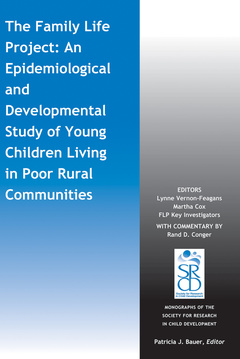The Family Life Project An Epidemiological and Developmental Study of Young Children Living in Poor Rural Communities Monographs of the Society for Research in Child Development (MONO) Series
Coordonnateurs : Vernon-Feagans Lynne, Cox Martha

About 20% of children in the United States live in rural communities, with child poverty rates higher and geographic isolation from resources greater than in urban communities. Yet, there have been surprisingly few studies of children living in rural communities, especially poor rural communities. The Family Life Project helped fill this gap by using an epidemiological design to recruit and study a representative sample of every baby born to a mother who resided in one of six poor rural counties over a one year period, oversampling for poverty and African American. 1,292 children were followed from birth to 36 months of age. This study used a cumulative risk framework to examine the relation between social risk and children's executive functioning, language development, and behavioral competence at 36 months. Using both the Family Process Model of development and the Family Investment Model of development, observed parenting was examined as a mediator and/or moderator of this relationship. Results suggested that cumulative risk predicted all three major domains of child outcomes and that positive and negative parenting and maternal language complexity were mediators of these relations. Maternal positive parenting was found to be a buffer for the most risky families in predicting behavioral competence. In a final model using both family process and investment measures, there was evidence of mediation but with little evidence of the specificity of parenting for particular outcomes. Discussion focused the implications for possible intervention strategies that might be effective in maximizing the early development of these children.
I. POVERTY, RURALITY, PARENTING, AND RISK: AN INTRODUCTION
Lynne Vernon-Feagans and Martha Cox 1
II. RECRUITMENT OF THE FAMILY LIFE PROJECT SAMPLE
Michael Willoughby, Margaret Burchinal, Patricia Garrett-Peters, Roger Mills-Koonce, Lynne Vernon-Feagans, and Martha Cox 24
III. THE DESCRIPTION OF THE FAMILIES AND CHILDREN
Patricia Garrett-Peters and Roger Mills-Koonce 36
IV. POVERTY AND ASSOCIATED SOCIAL RISKS: TOWARD A CUMULATIVE RISK FRAMEWORK
Margaret Burchinal and Michael Willoughby 53
V. CUMULATIVE RISK AND ITS RELATION TO PARENTING AND CHILD OUTCOMES AT 36 MONTHS
FLP Key Investigators 66
VI. DISCUSSION AND IMPLICATIONS FOR CHILDREN LIVING IN RURAL POVERTY
FLP Key Investigators 92
REFERENCES 109
ACKNOWLEDGMENTS 126
COMMENTARY
RURAL CHILDREN AT RISK 127
Rand D. Conger
CONTRIBUTORS 139
STATEMENT OF EDITORIAL POLICY 142
SUBJECT INDEX 144
Lynne Vernon-Feagans (Ph.D., University of Michigan) is the William C. Friday Distinguished Professor of Applied Developmental Science and Special Education in the School of Education at the University of North Carolina at Chapel Hill. She has focused her research on children at risk, including children living in rural poverty and children at risk for poor language and literacy development.
Martha Cox (Ph.D., University of Virginia) is a Professor of Psychology and past Director of the Center for Developmental Science at the University of North Carolina at Chapel Hill. She is best known for her longitudinal studies of family processes and relationships and children’s social and emotional development. She has contributed to the development of observational techniques in the study of families.
Rand D. Conger (Ph.D., University of Washington) is a Distinguished Professor of Psychology, Human Development, and Family Studies at the University of California–Davis. His program of research focuses on social, cultural, and individual characteristics that either promote successful development or lead to significant developmental problems.
Date de parution : 11-2013
Ouvrage de 316 p.
15x22.4 cm
Thème de The Family Life Project :
Mots-clés :
introductionlynne; cox; samplemichael; life; willoughby; family; iv; families; description; millskoonce; burchinal; frameworkmargaret; cumulative risk; social; monthsflp key; risk; vi; child outcomes; relation; references; povertyflp; rural



